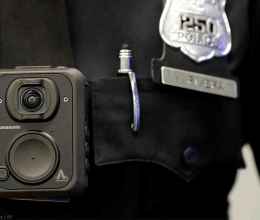YOUR RIGHTS
You have the right to remain silent. If you wish to exercise that right, say so out loud.
You have the right to refuse to consent to a search of yourself, your car or your home.
If you are not under arrest, you have the right to calmly leave.
You have the right to a lawyer if you are arrested. Ask for one immediately.
Regardless of your immigration or citizenship status, you have constitutional rights.
YOUR RESPONSIBILITIES
Do stay calm and be polite.
Do not interfere with or obstruct the police.
Do not lie or give false documents.
Do prepare yourself and your family in case you are arrested.
Do remember the details of the encounter.
Do file a written complaint or call your local ACLU if you feel your rights have been violated.
IF YOU ARE STOPPED FOR QUESTIONING
Stay calm. Don’t run. Don’t argue, resist or obstruct the police, even if you are innocent or police are violating your rights. Keep your hands where police can see them.
Ask if you are free to leave. If the officer says yes, calmly and silently walk away. If you are under arrest, you have a right to know why.
You have the right to remain silent and cannot be punished for refusing to answer questions. If you wish to remain silent, tell the officer out loud. In some states, you must give your name if asked to identify yourself.
You do not have to consent to a search of yourself or your belongings, but police may "pat down" your clothing if they suspect a weapon. You should not physically resist, but you have the right to refuse consent for any further search. If you do consent, it can affect you later in court.
IF YOU ARE STOPPED IN YOUR CAR
Stop the car in a safe place as quickly as possible. Turn off the car, turn on the internal light, open the window part way and place your hands on the wheel.
Upon request, show police your driver's license, registration and proof of insurance.
If an officer or immigration agent asks to look inside your car, you can refuse to consent to the search. But if police believe your car contains evidence of a crime, your car can be searched without your consent.
Both drivers and passengers have the right to remain silent. If you are a passenger, you can ask if you are free to leave. If the officer says yes, sit silently or calmly leave. Even if the officer says no, you have the right to remain silent.
IF YOU ARE QUESTIONED ABOUT YOUR IMMIGRATION STATUS
You have the right to remain silent and do not have to discuss your immigration or citizenship status with police, immigration agents or any other officials. You do not have to answer questions about where you were born, whether you are a U.S. citizen, or how you entered the country. (Separate rules apply at international borders and airports, and for individuals on certain nonimmigrant visas, including tourists and business travelers.)
If you are not a U.S. citizen and an immigration agent requests your immigration papers, you must show them if you have them with you. If you are over 18, carry your immigration documents with you at all times. If you do not have immigra- tion papers, say you want to remain silent.
Do not lie about your citizenship status or provide fake documents.
IF YOU ARE CONTACTED BY THE FBI
If an FBI agent comes to your home or workplace, you do not have to answer any questions. Tell them you want to speak to a lawyer first. Unless you have already spoken to an attorney, ask the agent to leave their contact information or business card with you.
You can contact your local ACLU office for assistance or referrals to attorneys that can assist you.
If you are asked to meet with FBI agents for an interview, you have the right to say you do not want to be interviewed. If you agree to an interview, have a lawyer present. Remember, you do not have to answer any questions you feel uncomfortable answering, and can say that you will only answer questions on a specific topic.
IF YOU ARE ARRESTED
Do not resist arrest, even if you believe the arrest is unfair.
Say you wish to remain silent and ask for a lawyer immediately. Don't give any explanations or excuses. If you can't pay for a lawyer, you have the right to a free one. Don't say anything, sign anything or make any decisions without a lawyer.
You have the right to make a local phone call. The police cannot listen if you call a lawyer.
Prepare yourself and your family in case you are arrested. Memorize the phone numbers of your family and your lawyer. Make emergency plans if you have children or take medication.
Special considerations for non-citizens:
- Ask your lawyer about the effect of a criminal conviction or plea on your immigration status.
- Don't discuss your immigration status with anyone but your lawyer.
- While you are in jail, an immigration agent may visit you. Do not answer questions or sign anything before talking to a lawyer.

